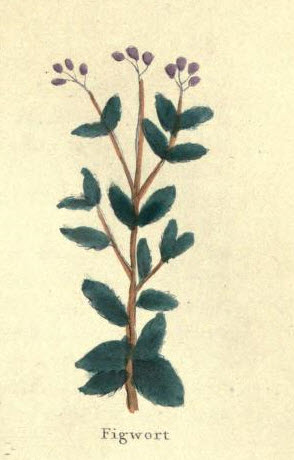
FIG WORT.Description:
Figwort Scrophularia. It is sometimes called Throatwort. Figwort has several strong, hard, square brown stalks, three or four feet high, on which grow dark green leaves, two at a joint, harder and larger than nettle leaves, but not stinging; at the tops of the stalks stand many purple flowers set in husks, which are sometimes gaping and open, somewhat like those of Water Betony; after which come round heads, a small point in the middle, containing small brownish seed. It is distinguished from Water Betony by not having the round indentings of the leaves, and it does not grow in water. The root is long, white, and thick, with many branches. It grows in moist and shadowy woods, and in the lower parts of fields and meadows. Herbal Remedies and Medicinal Uses of Figwort:There cannot be a better remedy for King's evil or Scrofula. The juice of the root is an excellent sweetener of the blood taken in small doses, for a long time together. The fresh roots bruised and applied as a poultice, give ease in the piles. A decoction of the leaves taken inwardly, and the herb bruised applied outwardly, removes congealed blood, within the body, arising from wounds, bruises, or falls. An ointment made of the green leaves is used for the same purposes, and dries up the virulent moisture of hollow and corroding ulcers; it takes away all redness, spots, and freckles in the face, and the scurf.
Important Disclaimer:
The information contained on this web site is for educational purposes
only. It is not intended to diagnose, treat, or cure any diseases. Any
information presented is not a substitute for professional medical advice
and should not take the place of any prescribed medication. Please do not
use this information to diagnose or treat a health problem or disease
without consultation with your physician.
This page and the rest of the encyclopedia of medicinal herbs was reproduced from old herbals written in the 1700 and 1800s. They are of historical interest to show the traditional uses of various herbs based on folk medicine and ancient wisdom. However the traditional uses for these herbs have not been confirmed by medical science and in some cases may actually be dangerous. Do not use the these herbs for any use, medicinal or otherwise, without first consulting a qualified doctor. Browse Herbs Alphabetically: A B C D E F G H I J K L M N O P Q R S T U V W X Y Z |
Advertisement
|
||
|
|||